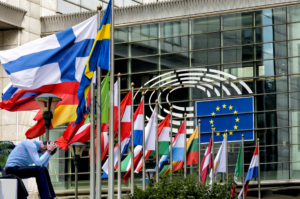The Fragile Fabric of Free Speech: An Economic Perspective

In a world where the definition and boundaries of free speech are constantly evolving, the words of Supreme Court Justice Oliver Wendell Holmes, Jr. still resonate. In the landmark case of Schenk v. U.S., 249 U.S. 47 (1919), Holmes articulated a crucial standard: free speech is protected unless it poses a “clear and present danger” to public safety or interests. Saying "fire" in a crowded theater exemplifies this principle. Today, the stakes are even higher as various governments reinterpret free speech to align with their political agendas.
In Europe, we are witnessing a disturbing trend where dissenting voices are labeled as "hate speech." A stark example comes from Britain, where an individual was sentenced to 20 months in prison for expressing frustration over tax contributions used to support migrants accused of heinous crimes. Such actions raise critical questions about the state of free speech in democratic societies: Can we genuinely claim to protect free speech if we criminalize expression dissenting from government policy?

Justice Hugo L. Black echoed similar thoughts in Everson v. Board of Education, 330 U.S. 1 (1947), identifying the First Amendment as rooted in a historical commitment to personal freedom and expression. He referred to a bill introduced by Thomas Jefferson in 1779 that championed religious freedom and, by extension, the right to express opinions freely. Black stated:
"The rights hereby asserted are of the natural rights of mankind, and… any act passed to repeal the present or narrow its operation will be an infringement of natural right."
This sentiment underscores a fundamental economic principle: the free exchange of ideas fosters innovation and prosperity. When dissent is stifled, economic progress withers.
The Right to Speak Freely: Landmark Supreme Court Cases
Justice John Marshall Harlan made his mark in Cohen v. California, 403 U.S. 15 (1971), where he defended an individual’s right to express dissent through provocative language. The court ruled that the state could not criminalize the public display of a four-letter word in a political context. This principle has critical implications today, especially as governments in Europe implement increasingly autocratic measures silencing opposition voices.
Here are just a few of the vital facets of free speech recognized by the courts:
- Not to Speak: As established in West Virginia Board of Education v. Barnette, 319 U.S. 624 (1943), individuals maintain the right not to salute the flag.
- Political Protest: In Tinker v. Des Moines, 393 U.S. 503 (1969), students were guaranteed the right to wear black armbands to protest war, asserting that students do not shed their constitutional rights at school.
- Political Contributions: Buckley v. Valeo, 424 U.S. 1 (1976), recognized that contributing to political campaigns is a form of speech.
- Symbolic Speech: In Texas v. Johnson, 491 U.S. 397 (1989), the Supreme Court affirmed that actions like flag burning are protected under free speech.
The Demise of Free Speech in Europe: An Economic Analysis

As Europe grapples with economic instability, a curious paradox emerges. Economically beleaguered nations often resort to authoritarian measures under the guise of maintaining public order. Countries like Germany have strangely claimed that free speech exists as long as it doesn’t oppose government narratives. This contradiction undermines the very essence of what it means to have a free society and reflects a broader economic malaise.
Additionally, the European Union is collapsing under the weight of its financial inconsistencies. The inability to consolidate debts has created disparities among member nations, isolating countries economically and politically. As conditions worsen, authoritarian governance is likely to escalate. Consider that the Euro has not succeeded in replacing the dollar as a global currency, primarily due to its fragmented debt market.
A concerning trend reveals that foreign investments are rapidly withdrawing from Europe. Recently, Japanese investors divested a staggering $53 billion from Eurozone bonds, a record pace driven by fears of impending capital controls amid escalating conflict and economic uncertainty. As those in power beat the war drums, smart money is leaving the EU, predicting a potential financial fallout.

In conclusion, understanding the implications of free speech and its economic ramifications is crucial in today’s volatile landscape. The relationship between governance, speech, and economic freedom cannot be overstated. If we do not strive to protect free expression, the consequences extend far beyond individual rights—impacting innovation, economic growth, and societal progress.
At Extreme Investor Network, we are dedicated to empowering you with the knowledge needed to navigate these complex issues. By fostering an informed community, we can champion the principles of free speech to secure a brighter, more equitable economic future. Join us as we explore these critical economic intersections and advocate for truth, transparency, and resilience in today’s world.

